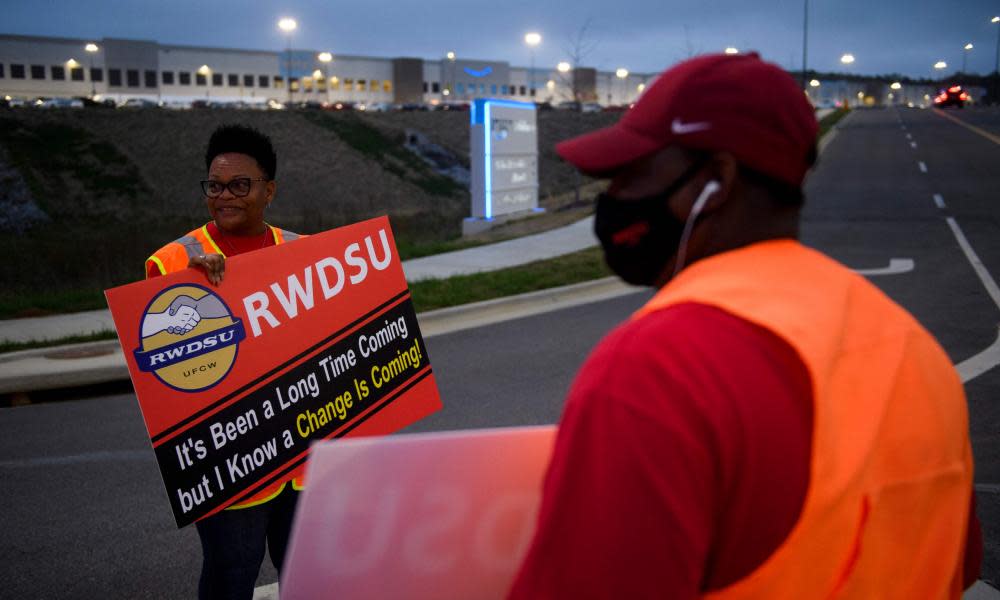US unions not fazed by Amazon setback and vow to keep up the organizing fight

The coronavirus has spurred worker organizing efforts around the United States, as the spread of the virus created a sense of urgency in improving working conditions, safety protections and job security.
Related: Amazon rejects claims it intimidated Alabama workers during union vote
That has meant a surge in support for unions in America, and has given the national labor movement a powerful surge in support. According to data from the American National Election Surveys, public support for unions is at its highest since the surveys were first conducted in the 1950s, and public opinion toward big business at an all-time low.
Joe Biden, Democrats and labor leaders are pushing for the passage of the Pro Act, which would represent the largest labor reform legislation since the Great Depression, aimed at helping workers organize unions and rein in interference from employers. The bill passed in the House of Representatives in March and is currently awaiting a vote in the Senate.
Several of the organizing efforts spurred by the coronavirus have culminated in union elections in some industries with low unionization rates.
On Friday, that movement suffered a setback when workers at an Amazon warehouse in Alabama voted against forming a union after a fiercely contested fight that garnered national attention.
But labor groups say they are undaunted, and point to progress in a wide range of industries.
For example, more than 460 insurance agents with AAA Northern California, Nevada, and Utah filed for a union election on 24 March, an industry with a low unionization rate at 2.4% as of last year.
Workers explained the union drive began in response to lack of job security for employees who have been with the company for years, intimidation and threats of termination, and increasing pressure placed on employees during the pandemic.
“Our goals never changed. In fact, they increased for a lot during the pandemic,” said an insurance agent who requested to remain anonymous for fear of retaliation.
Meanwhile, about 375 workers at the small coffee chain Colectivo, with 16 store locations in Illinois and Wisconsin, recently finished their union election to join the international Brotherhood of Electrical Workers (IBEW) after an organizing drive that has involved alleged firings, retaliation, coercive actions and anti-union meetings by management.
Counting began on 6 April, with the results contingent on 16 challenged ballots in the election as non-challenged votes resulted in a 99-99 vote tie. A hearing on the challenged ballots is scheduled for 27 April.
Food preparation and serving related occupations in the US also have among the lowest rates of unionized workforces, at a rate of 3.4% last year.
If successful, the workers at Colectivo would form the largest union at a US-based coffee chain.
Patrick Zastrow, a worker at Colectivo in Milwaukee, said the organizing effort started during the pandemic amid the uncertainty workers felt in job security and communication breakdowns between management and staff. He expressed disappointment in the opposition to the union from Colectivo ownership, which has framed themselves and the company as progressive.
He said: “It’s been an incredibly, emotionally challenging year and the uncertainty of not knowing whether the cafes were going to shut down because of lack of sales, because of people getting sick, or because of any kind of retaliation from the company. It was tough.”
A statement from Colectivo said several of the charges filed by workers through the union at the National Labor Relations Board were withdrawn.
“We want to be clear that as people with progressive values, we are not against the right to organize, and we are not anti-union. However, we do believe very strongly that this union, the International Brotherhood of Electrical Workers, will not solve the challenges of this company and will not make our co-workers’ Colectivo experience better,” it said.
Throughout the pandemic, workers at non-profits around the US have sought to unionize. High-profile non-profits such as the Sunrise Movement, the ACLU and the Animal Legal Defense Fund have unionized or announced intentions to do so.
Many of these campaigns have been successful, some with voluntary recognition from their employers, and others in the face of staunch opposition to the idea of their workers forming unions.
In March, about 400 workers at the National Audubon Society publicly announced their union organizing drive with the Communications Workers of America after mass layoffs and complaints from workers in regards to how diversity, equity and inclusion programs have been handled by management.
“There were widespread layoffs last spring. More than 100 employees were let go and I think [they] were a driving factor for galvanizing employees to form a union,” said Alisa Opar, features editor for Audubon Magazine for nearly 13 years. “They demonstrated just how little job security we have.”
Refugio Mariscal, conservation data coordinator for Audubon Great Lakes, said he took issue with the National Audubon Society purporting to be an anti-racist organization but hiring the union-avoidance law firm Littler Mendelson in response to predominantly workers of color seeking to form a union.
“We’ve asked them, our leadership, board and chief executive, to drop Littler Mendelson, and to voluntarily recognize the wishes of their employees, who are the heart and soul of this organization. Without us being experts in what we do, we can’t really do much to save birds, the environment, and people,” he said.
A spokesperson for the National Audubon Society said Littler Mendelson was hired to offer legal guidance and claimed the unfair labor practice charge alleging interference and intimidation from management was “contrary to the official guidance we provided to managers”.
They added: “We respect the right of workers to make a case for forming a union, and appreciate employees’ commitment to Audubon’s work and workplace. Audubon’s view is that this is a decision for employees to make for themselves, and management will not interfere with that decision in any way.”

